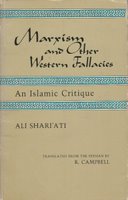
Translated from Persian by R. Campbell ISBN 0-933782-06-3 Preface by Hamid Algar.
On April 23, 1979, a terrorist group by the name of Forqan assassinated General Muhammad Vali Qarani, first chief of staff of the Iranian armed forces after the revolution. This was followed on May 1 by the murder of Ayatullah Murtaza Mutah-hari, a close associate of Imam Khomeini, and three weeks later by an attempt on the life of Ayatullah Hashimi Rafsinjani; Forqan also claimed responsibility for those crimes. In a communiqué forwarded to the Tehran newspaper Ayandegan always eager to print such material, before it was closed down by the revolutionary prosecutorthe anonymous hands of Forqan wrote that they were in the service of the thought of Shari'ati and attempting to realize his alleged vision of an Islam without akhunds, i.e., institutionalized religious leadership.
It is highly probable that Forqan is ultimately under the command of persons owing their allegiance to the former regime, and possibly, also, to the American patrons of that discredited tyranny. Certainly American officialdom has begun showing a remarkable interest in the work of Shari'ati. For example, in January, the State Department began making inquiries concerning his thought and influence, and three months later, attempts were made to recruit someone to brief Cutler, then ambassador-designate to Iran, on the same subject. Once the activities of Forqan are considered in the context of continual imperialist activity to destabilize the Islamic Republic of Iran, they appear as a tactic designed to create a dichotomy in the Islamic movement: on the one side, the posthumous following of Shari'ati, "anti-clerical" in its attitudes, and opposing them, those loyal to the religious leadership, above all Imam Khomeini.
Given this probable counterrevolutionary direction of the activities of Forqan, it may be conceded that some of the followers of the movementthose entrusted with the business of killinggenuinely believe in the necessity for eradicating the ulama. All too numerous in Iran are young people whose acquaintance with Islam is recent and superficial, and for whom Islam means, above all, a permanent and unbridled revolutionary fervor. As the late Ayatullah Mutahhari pointed out, hypocrites always need fools to carry out their plans, and it is likely that Forqan is indeed an alliance of scheming hypocrites and gullible fools. The most effective way to recruit the fools, it appears, has been to invoke Shari'ati as the alleged ideologue of anti-clerical Islam.
Because certain pseudo-academic authorities have attempted to legitimize this claim of Forqan to the legacy of Sharijati3, we would like to clarify here the attitudes that Shari'ati did in fact hold toward the ulama, the traditional leaders. It is obvious that he was not of their number, and that his ideas and expression bore a "modern" stamp that did not always correspond to their taste. His works are replete with references to Western thought and history, and even though these references are for the most part negative, they must have had a jarring effect on an extremely traditionalist audience. Shari'ati discerns, moreover, as a perpetual and universal sociological phenomenon, the existence of an "official" clergy, allied with the oppressive state and the holders of wealth, as a major component in the system of injustice. Such a clergy may exist even in an Islamic and Shi'i setting, and Shari'ati designated the celebrated Baqir Majlisi (d. 1699! as a representative of that class, the function of which is to destroy rather than to serve religion.
None of this means, however, that Shari'ati rejected the institution of religious leadership. Non-traditional is different from anti-traditional, and criticism of certain religious leaders of the past by no means implies a partial or, still less, a total, and repudiation of those of the present. Shari'ati clarified his attitude to the ulama by denying them "official" (rasmi] standing on the one hand, and by regarding them as fulfilling an essential need (zarurat) on the other. That is, donning the garb of the religious scholar confers no privilege or special status, and is in no way akin to being ordained a Christian priest. There is a real and, practical need for the cultivation of expertise in religious knowledge, and herein lays the function undertaken by the ulama on behalf of the community. In addressing themselves to this task, the ulama are not merely legitimate, they are indispensable.
It should further be noted that many of the particular criticisms of the social and political shortcomings of the ulama made by Shari'ati have also been raised with some insistence by Imam Khomeini himself. In the lectures he gave at Najaf in 1969, Khomeini repeatedly castigated those religious scholars who confined their attention to the minor details of ritual purity for betraying the dignity and true mission of their class. Despite differences of tone and emphasis, both Shari'ati and Imam Khomeini have contributed to the revival of religious thought and activism in Iran, and their influences have been exercised in largely complementary fashion. Anyone only slightly acquainted with the Iranian revolution knows that countless Iranians regard themselves simultaneously as the followers of Imam Khomeini and as the disciples of the late Ali Shari'ati, and this entails neither divided loyalties nor mental contortions. Those who hope to exploit the ignorance and excessive fervor of a minority of young Iranians in order to create warring camps in the Islamic revolution and thereby to destroy it are liable to be disappointed.

















